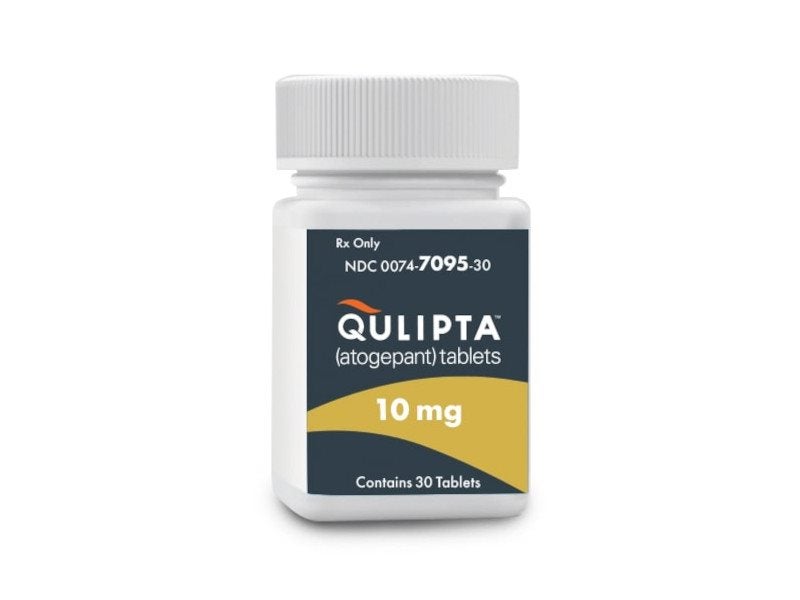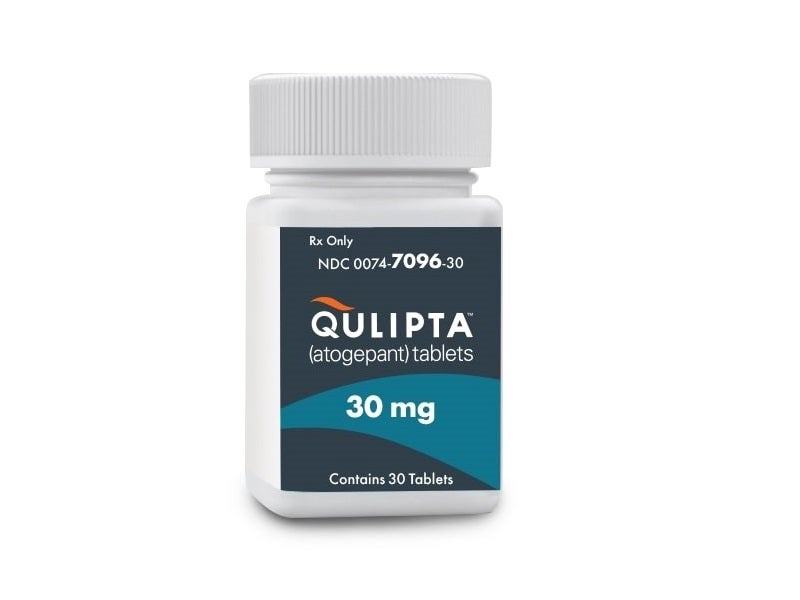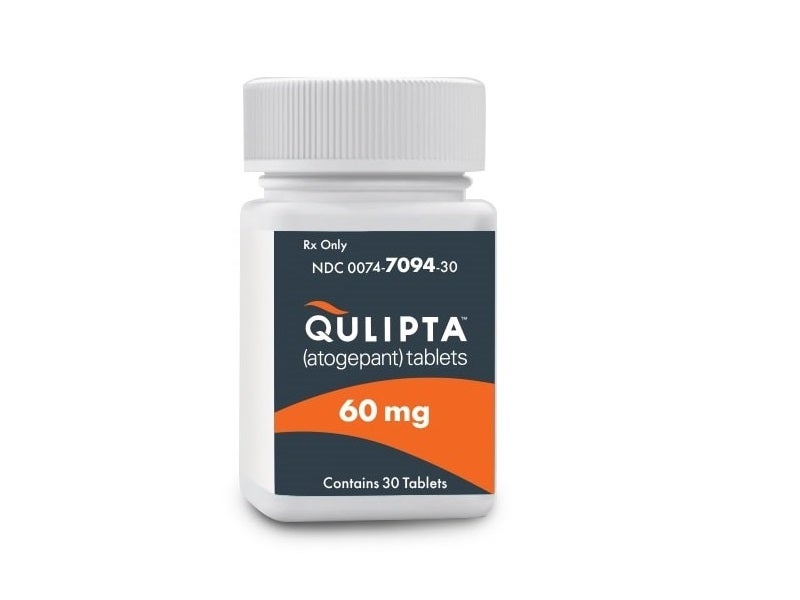Qulipta (atogepant) is a prescription medicine indicated for the preventive treatment of episodic migraine in adults.
Developed by US-based biopharmaceutical company AbbVie, Qulipta is available as a once-daily, white to off-white, round or oval biconvex tablet containing 10mg, 30mg or 60mg of atogepant.
Regulatory approvals for Qulipta
In January 2021, AbbVie submitted a new drug application (NDA) for atogepant to the US Food and Drug Administration (FDA) for the preventive treatment of migraine in adults, meeting the criteria for episodic migraine. The NDA was accepted for review in March 2021.
Qulipta received approval from the FDA for the preventive treatment of episodic migraine in adults in September 2021.
In January 2023, Qulipta was approved by Health Canada for the preventive treatment of episodic migraine in adults.
In June 2022, AbbVie submitted a supplemental NDA to the FDA for Qulipta for the preventive treatment of chronic migraine in adults. The FDA approved Qulipta for the indication in April 2023.
AbbVie received a positive opinion from the European Medicines Agency’s Committee for Medicinal Products for Human Use for atogepant in June 2023, recommending the drug’s approval for the treatment of prophylaxis of migraine in adults experiencing four or more migraine days in a month.
Migraine causes and symptoms
Migraine is a neurological disease characterised by incapacitating intermittent attacks of intense, throbbing headaches accompanied by symptoms such as increased sensitivity to light, sound, touch or smell, tingling or numbness in the extremities or face, dizziness, nausea, vision abnormalities, and vomiting.
Other debilitating symptoms may be present without the presence of headaches in certain situations.
Migraine is a complicated disease that affects approximately 40 million individuals in the US and more than one billion people globally. Migraine is the leading cause of disability in people aged 50 years or younger worldwide.
Qulipta’s mechanism of action
Qulipta is a calcitonin gene-related peptide (CGRP) receptor antagonist, commonly known as a gepant, specifically designed for the preventive treatment of migraine.
The concentration of CGRP protein in the brain increases during migraine attacks or episodes of headaches. This may support the initiation of migraines, worsen the pain or prolong the attack.
Atogepant binds to the CGRP receptor on the brain’s trigeminal nerve and blocks the activation of the migraine.
Clinical trials on Qulipta
Qulipta’s safety, efficacy, and tolerability for the preventive treatment of episodic migraine in adults was demonstrated in roughly 2,500 patients experiencing four to 14 migraine days a month. These patients were enrolled in a pivotal Phase III clinical study, ADVANCE, as well as a Phase II b/III clinical trial and a Phase III long-term safety study.
ADVANCE is a multi-centre, randomised, double-blind, placebo-controlled, parallel-group clinical trial in which 910 recruited patients were randomised in a 1:1:1:1 ratio to receive either 10mg/30mg/60mg of Qulipta or placebo. The drug’s efficacy was studied in 873 patients.
The ADVANCE trial’s primary outcome was the change observed in the incidence of monthly migraine days from baseline during the 12-week treatment period. Patients treated under all the Qulipta dose groups showed statistically significant reductions in mean monthly migraine days compared to placebo. Patients treated with 60mg of Qulipta experienced a 4.2-day reduction from a 7.8 baseline.
The secondary endpoint assessed the patient population who experienced a 50% or greater reduction in monthly migraine days throughout the 12-week treatment period.
The study revealed that 56%, 59% and 61% of patients in the 10mg, 30mg, and 60mg Qulipta arms respectively experienced a 50% to 100% reduction in monthly migraine days, compared to 29% in the placebo arm.
All active treatment arms met the primary efficacy endpoint of change from baseline in mean monthly migraine days in the Phase IIb/III trial, with significantly greater reductions in mean monthly migraine days across the 12-week treatment period for all three Qulipta treatment groups compared to placebo.
Adverse effects observed in patients during the two clinical trials were nausea, constipation, fatigue, and decreased appetite.
The FDA’s approval of Qulipta for the treatment of chronic migraine was based on the Phase III PROGRESS clinical trial. The study enrolled patients who were suffering from chronic migraine for one year and had around 15 headache days in addition to more than or equal to eight migraine days in the 28 days prior to randomisation.
The study met its primary endpoint, which was a reduction in mean monthly migraine days from baseline for 60mg once daily and 30mg twice daily doses of Qulipt, compared to placebo over a 12-week treatment period.
Patients treated with Qulipta also achieved statistically greater improvements from baseline for major secondary endpoints, including mean monthly headache days and mean monthly acute medication use days.
AbbVie’s portfolio for migraine management
AbbVie is the only pharmaceutical company that offers three treatments options, namely Botox (onabotulinumtoxinA), Ubrelvy (ubrogepant) and Qulipta (atogepant), covering the complete spectrum of migraine.
Botox (onabotulinumtoxinA) is a preventive treatment for patients with chronic migraine, while Ubrelvy is an acute treatment for adults with migraine.
AbbVie has spent around $50bn on research since its establishment in 2013 to discover, develop, and deliver new medicines across a range of therapeutic areas.





